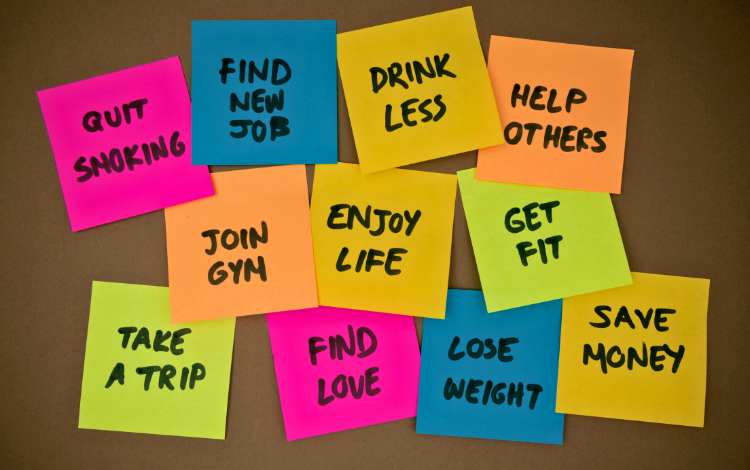
Are your New Year’s resolutions already starting to feel like a distant memory? It happens to the best of us. Don’t worry, there’s still time to get them back on track and achieve the goals you set for yourself.
Why do resolutions often fail? What are some of the reasons why a resolution may fail?
In this article, we will learn why resolutions fail and explore eight effective strategies to revive those failed resolutions and turn them into successful habits.
Understanding Why Resolutions Fail
Resolutions often fail because they are too vague or unrealistic. When we set too broad or demanding goals, it’s easy to get overwhelmed and lose motivation.

How to Use the Law of Attraction to Shape Your Reality.
Discover How to Manifest and Achieve Dreams and GoalsTake a moment to reflect on why your previous resolutions may have failed. Was it due to a lack of planning, unrealistic expectations, or commitment?
Understanding the reasons behind your failures can help you avoid repeating the same mistakes.
1. Reflecting on Your Failed Resolutions
Now that you understand why your resolutions failed, it’s time to reflect on what you can learn from those failures.
Reflecting on your past experiences allows you to gain insight into what went wrong and how you can improve.

Weekly lessons with guidance, actionable tips, and exercises to help you step beyond the daily, ordinary life, expand your consciousness and awareness, and cultivate a life of mindfulness, inner peace, and self-awareness.
👉 Join the Inner Awakening Weekly Lessons Membership
Ask yourself what obstacles you encountered and what factors contributed to your lack of progress. By identifying these challenges, you can come up with strategies to overcome them and ensure success moving forward.
2. Setting Realistic and Achievable Goals
Setting realistic and achievable goals is one of the keys to getting your resolutions back on track. Instead of aiming for a massive overnight transformation, break your goals into smaller, more manageable steps.
For example, if you resolve to lose weight, set a goal to exercise for at least 30 minutes three times a week. Setting smaller goals will build momentum and increase your chances of success.
3. Breaking Down Your Goals into Smaller Tasks
Once you set your realistic goals, it’s time to break them into actionable tasks. Identify the specific actions you need to take to achieve each goal.
Using the weight loss example, your tasks may include meal planning, grocery shopping for healthy foods, and finding a workout routine that suits you.
- Inner Awakening Weekly Lessons — Weekly practices for stepping beyond the daily, ordinary life.
- Moments of Joy — A guide to daily happiness from within.
- How to Focus Your Attention — Excercises to cut distraction and build concentration.
- Manifest & Achieve Whatever You Want — Step-by-step visualization for success.
Breaking down your goals into smaller tasks makes them less overwhelming and easier to tackle.
4. Creating a Plan and Timeline for Your Goals
Now that your goals and tasks are defined, creating a plan and timeline is crucial to keep yourself on track. Start by mapping out the steps you need to take and assigning deadlines to each task.
Having a clear plan and timeline will help you stay organized and focused. It also allows you to track your progress and make adjustments if necessary.
Every week, you'll get access to exclusive, members-only short lessons with practical exercises and uplifting insights. These lessons are structured to help you pause, stay grounded, and handle life’s challenges with calm and strength.
👉 Subscribe for the Weekly Calm Lessons
5. Finding Accountability and Support
Accountability and support are invaluable when it comes to achieving your resolutions. Find someone who can hold you accountable and provide support and encouragement along the way.
This could be a friend, family member, or professional coach. Sharing your goals with someone else increases your sense of responsibility and helps you stay motivated, even when things get tough.
6. Staying Motivated and Overcoming Obstacles
Staying motivated is crucial to getting your resolutions back on track. Find ways to keep yourself inspired and focused on your goals. This could involve creating a vision board, journaling about your progress, or finding daily affirmations that resonate with you.
Additionally, be prepared for obstacles and setbacks. They are inevitable on the journey to achieving your goals. Instead of letting them derail you, view them as opportunities to learn and grow.
Strategies for Getting Back on Track with Your Resolutions
Now that you clearly understand the steps involved in achieving your resolutions, it’s time to put those strategies into action. Stay committed to your plan, and remember to celebrate your progress along the way.
Implementing these strategies consistently will help you regain momentum and get back on track with your resolutions.
7. Celebrating Your Progress and Milestones
As you make progress towards your goals, it’s essential to celebrate your achievements along the way. Take time to acknowledge your hard work and the milestones you reach.
Celebrating your progress boosts your motivation and reinforces the positive habits you are building. Treat yourself to small rewards or share your achievements with others who can celebrate with you.
8. Embracing Failure as a Stepping Stone to Success
Getting back on track with your resolutions may require some adjustments and a change in mindset.
Look at the failures and setbacks as valuable learning opportunities that will ultimately lead you to success. Remember, it’s never too late to revive your resolutions and make lasting changes.
A word of Advice – Don’t Be Too Attached to Resolutions and Goals
Following and achieving resolutions gives you a reason to get up energetic and motivated each morning. It makes life a pleasant journey.
However, be careful not to be too attached to your goals and resolutions. If you do, you might get frustrated and angry if your plans don’t work out. Being a little detached protects you from getting obsessed with your goals.
If things don’t work out, detachment will help you stay calm, and failure and obstacles will not affect your inner peace and happiness.
Resolutions are important, but don’t let them dominate everything in your life. Sometimes, you need to be flexible. Resolutions and goals are important, but your life, happiness, family, and hobbies are no less important.

Master Affirmations and Reprogram Your Mind.
Discover the Practical Affirmations eBook
 Founder of SuccessConsciousness.com,
Founder of SuccessConsciousness.com,